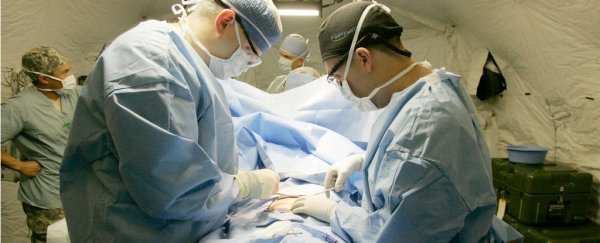Scientists in Australia have created a world-first device that monitors changes in brain activity during surgery to detect if someone's coming out from under anaesthesia. This will help anaesthetists to adjust drug delivery as required, and make sure patients remain pain-free and unconscious until they're supposed to.
Doctors currently have a range of machines used to monitor patients while they're under anaesthetic, including brain monitors that detect the electrical patterns of the brain. But unfortunately some patients still report becoming conscious or 'waking up' during surgery. "Measuring how unconscious a patient is while they are under anaesthetic is particularly important, because if a patient is not completely unconscious they will remember the surgery, which can be quite a traumatic experience," said David Liley from Swinburne University of Technology, who worked on the device.
A study last year found that roughly one in 19,600 patients wake up during surgery - with the rates as high as one in 670 for certain procedures. Those numbers are thankfully quite low, but for those who do wake up during surgery, the experience is incredibly damaging, and can lead to post traumatic stress disorder, anxiety, and insomnia.
"I was awake but paralysed," Carol Weihrer, a woman in the US who woke up during eye surgery in 1998, told CNN last year. "I could hear the surgeon telling his trainee to 'cut deeper into the eye'. I was screaming, but no one could hear me. I felt no pain, just a tugging sensation … I thought I was dying."
So the team from Swinburne University of Technology created what's known as a Brain Anaesthesia Response (BAR), which is capable of recording the brain's electrical activity during surgery, via three sensors placed on the forehead and behind each ear.
Not only will this help to make sure patients stay under throughout the whole surgery, but it also means that anaesthetists will be able to use drugs more efficiently, reducing surgery costs and risks.
"The BAR Monitor has the potential to reduce the risks associated with surgical procedures, increase levels of patient care, optimise the use of anaesthetic agents, lower costs through reduced drug usage and in turn create a faster bed turnaround in the theatre and post-operative recovery rooms," said Liley.
The device has already been tested on patients and commercially developed in conjunction with medical device company Cortical Dynamics Ltd, and it's just received certification from the Therapeutic Goods Administration - the regulatory body that controls which medicines and medical devices can be used in Australia.
Hopefully the technology quickly becomes approved in other countries too, because the whole world needs access to safer surgery.
Update 19 October 2015: We've adjusted the second paragraph to clarify that anaesthetists do currently monitor a range of machinery, including devices that can detect the brain's electrical activity.
Swinburne University of Technology is a sponsor of ScienceAlert. Find out more about the research happening at Swinburne University of Technology.
